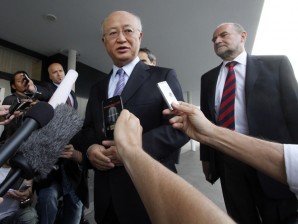VIENNA — The head of the U.N. nuclear agency flew to Tehran on Sunday on a delicate mission that — if successful — could finally lift the veil on whether Iran is seeking atomic arms while strengthening the Islamic Republic’s negotiating hand in crucial nuclear talks with six world powers later in the week.

Director General of the International Atomic Energy Agency, IAEA, Yukiya Amano from Japan and Herman Nackaerts, from left, of the IAEA the chief agency official in charge of the Iran file speak to the media before a flight to Iran at the Vienna International Airport near Schwechat, Austria, on Sunday, May 20, 2012. AP/RONALD ZAK
The trip by International Atomic Energy Agency chief Yukiya Amano is focused on getting agreement from Iran to terms that will allow the agency to resume probing whether Tehran secretly worked on nuclear arms.
Even if that happens, Western diplomats have expressed skepticism that Iran will honor a deal. But with both Iran and the IAEA reporting progress in a previous round last week, anticipation was high as Amano prepared to board his flight to Tehran.
While expressing some optimism, Amano said he could not predict whether he would clinch a deal that would allow his agency to renew its long-stalled probe.
“Nothing is certain in life, in diplomacy,” he told reporters at Vienna’s airport. “But there has been good progress.
“I really think this is the right time to reach agreement.”
The one-day trip is significant both for what it can achieve in terms of probing Iran’s secretive nuclear program and as a mood-setter for talks Wednesday in Baghdad between Iran and the United States, Russia, China, Britain, France and Germany.
The latter six nations are in the forefront of trying to persuade Tehran to curb its nuclear program and ease concerns it wants to use it to make nuclear weapons.
Iran will seek to stay looming U.S. and European Union sanctions on its oil exports at the Baghdad talks.
The six in turn will attempt to get Iran to commit to stop enriching uranium to a level that can be turned quickly into the fissile core of nuclear warheads, while ignoring — for now— its program of lower enrichment, which would take longer to turn toward weapons-making.
Iran insists it is enriching uranium only to produce nuclear fuel. It denies that it worked secretly on developing components of a nuclear arms program, despite what the IAEA describes as credible intelligence and other evidence that it hid work “specific to nuclear weapons.”